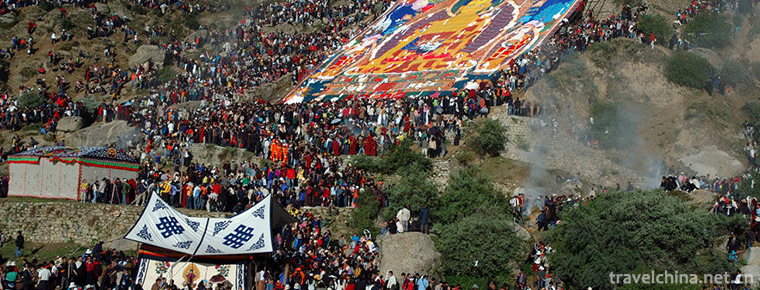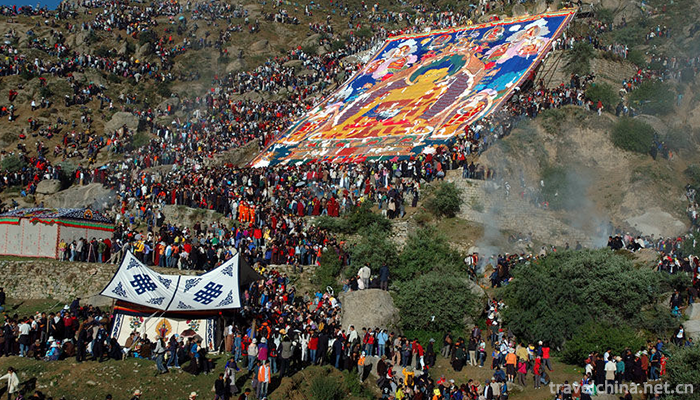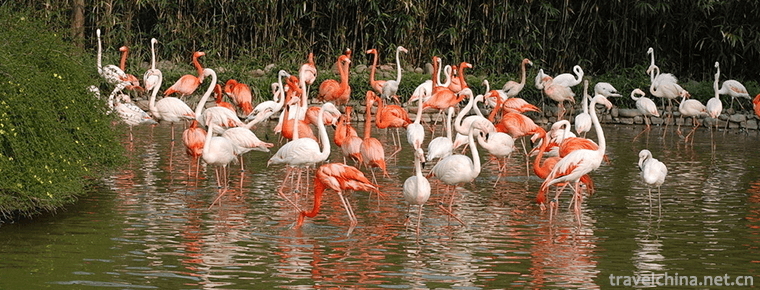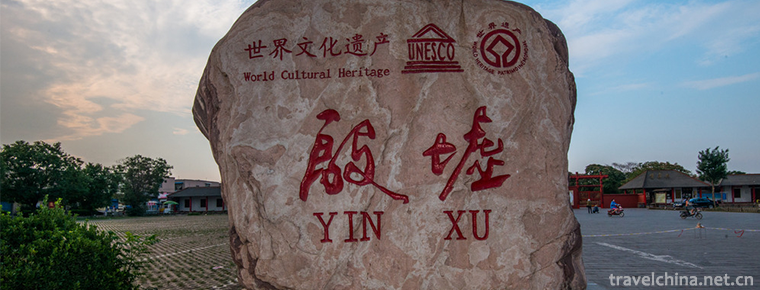2018-12-05

- By ChinaWiki.net
- Chinese Edition
- 2019-07-09
Sho Dun Festival
The Shirton Festival is a traditional religious festival of Tibetan people in Tibet, Qinghai, Gansu, Sichuan, Yunnan and other provinces and regions. It is mostly held in early February, mid-April or mid-June of the Tibetan calendar. The specific dates vary from place to place.
In Tibetan, the Shirton Festival is interpreted as a yoghurt festival, so it is also called "Yoghurt Festival". Because there are grand and enthusiastic Tibetan opera performances and grand Buddha-drying ceremonies during the Shelton Festival, some people also call it "Tibetan Opera Festival" and "Buddha-drying Festival".
In May 2006, the Shelton Festival declared by the Tibet Autonomous Region was approved by the State Council to be included in the first batch of national intangible cultural heritage lists.
Origin of Festivals
Orion of the Name
The Shirton Festival, also known as the Tibetan Opera Festival, is one of Tibetan traditional festivals. In Tibetan, "snow" means yogurt, while "ton" means "feast" and "eat". The Shirton Festival is interpreted as the Yogurt Festival in Tibetan. The Tibetan calendar is held on July 1 every year for four or five days. Shelton is a Tibetan translator, meaning "yoghurt feast", so Shelton Festival is interpreted as a festival for drinking yoghurt. Later, it gradually evolved into a Tibetan opera festival, also known as Tibetan opera festival. According to the provisions of the Gelug Sect of Tibetan Buddhism (Huang religion), the fifteenth to thirtieth day of June in the Tibetan calendar is forbidden every year. Lamas in large and small temples are not allowed to go out in order to avoid trampling on insects. They can not go down the mountain until the ban is lifted on June thirtieth. When the Lama went down the mountain, farmers and herdsmen offered yogurt to form the Shelton Festival.
Later, the activities of the Shelton Festival gradually evolved into a Tibetan opera festival, so it was also called the Tibetan opera festival. This Festival is not only in Lhasa, but also in Shigaze called "Semuqinbo", which is later than Lhasa and smaller than Lhasa. Before the seventeenth century, the Shirton Festival was a pure religious festival. According to the regulations of the Gelug Sect of Tibetan Buddhism, the fifteenth to thirtieth day of the Tibetan calendar is forbidden every year. Monks and nuns of all Tibetan temples are not allowed to go out for activities in order to avoid stepping on small insects. They should do three things in the temple: Changjing, Xia'an'an's residence until the dissolution of the system. On the day when the ban was lifted on July 1 of the Tibetan calendar, farmers and herdsmen came down the hill one after another. At this time, farmers and herdsmen had to offer their prepared yoghurt. This is the origin of Shelton's Day.
development history
Shelton Festival originated in the middle of the 11th century AD. It was first formed in Zhepeng Temple. At that time, Shelton Festival was a pure religious activity. According to folklore, there are more than 300 Buddhist precepts, the most taboo is killing lives. Because of the warming weather in summer, the growth of grass and trees, insects and insects, and the recovery of all things, monks inevitably trample and kill their lives when they go out, violating the "no killing" rule. Therefore, the Gru sect's precepts stipulate that during the period from April to June of the Tibetan calendar, lamas can only stay in monasteries and practice quietly, called Yale, which means "living in peace in summer", until the end of June. On the day when the ban was lifted, monks came out of the temple one after another, and the common people prepared yogurt for monks to reward them, held picnic banquets for them, and performed Tibetan operas at festivals. This is the origin of Shelton's Day.
From the second half of the seventeenth century to the beginning of the eighteenth century, the Qing emperor sealed the fifth Dalai Awan Rosan Katsuo and the fifth Panchen Rosan Yixi, and gave them the Golden Book and the golden seal, thus strengthening the system of the unity of politics and religion in Tibet.
In 1642, the Gelug sect of Tibetan Buddhism (Huang religion) took power in Tibet. The fifth Dalai Lama ascended the throne of King Fa. He was stationed in Gandanpo Zhanggong Palace, Zhepeng Temple, Xixi, and became the political, religious and cultural center of the dynasty. In recent years, various organs and units of the autonomous region have also arranged large-scale literary and artistic activities, academic seminars and economic and trade exchanges during the Shelton Festival, making the scene more lively and extraordinary.
In 1959, after the democratic reform in Tibet, the content of the Shelton Festival became more abundant. During the festival, Tibetan people near Lhasa flocked into Robrinkane, carrying various burdens and barley barrels. During the festival, in addition to the local Tibetan theatre troupe, there are also Tibetan theatre troupes from Qinghai, Gansu, Sichuan and Yunnan provinces who come to the holy city of Lhasa to discuss theatre. In addition to watching Tibetan opera, people also set up colorful tents under the shade of trees, laying mats, carpets, fruit wine, dishes and other festival foods on the ground. Some talked and drank while others danced and sang. Many literary and artistic groups also performed folk songs and dances to help them enjoy themselves. The commercial sector transports all kinds of goods and festival food to Roblinkane, sets up stalls and shelters for tourists. In the afternoon, each family began to act as guests. The host offered three mouthfuls of "Songjun Nieta" wine to the guests. While persuading the guests to drink, they sang wine songs of different tunes. In each tent, they toasted each other. It was very lively. The organs and units of the autonomous region will arrange large-scale literary and artistic activities, academic seminars and experience exchange meetings during the Shelton Festival, which makes the Shelton Festival more significant.
Festival Significance
Over the past 200 years, Lhasa has witnessed the coexistence of Philosopher Ben Shelton, Budala Shelton and Roblinka Shelton, with Roblinka as the center. The Shelton Festival is an important Tibetan Festival and a concrete manifestation of the continuity of Tibetan culture. To celebrate this festival is of positive significance for Tibetans to maintain their unique national culture, strengthen national unity and maintain the cultural diversity of the world.
With the evolution of history, today the Shelton Festival has become a grand gathering of traditional Buddhist exhibition, literary and artistic performance, sports, investment attraction, economic and trade negotiations, commodity exhibition, tourism and leisure as one of the traditional and modern combination. To commemorate the ancestors of Jianqiao and the seven girls who can sing and dance the origin of Tibetan opera.

Ask a Question
Your email address will not be published.



0 Questions